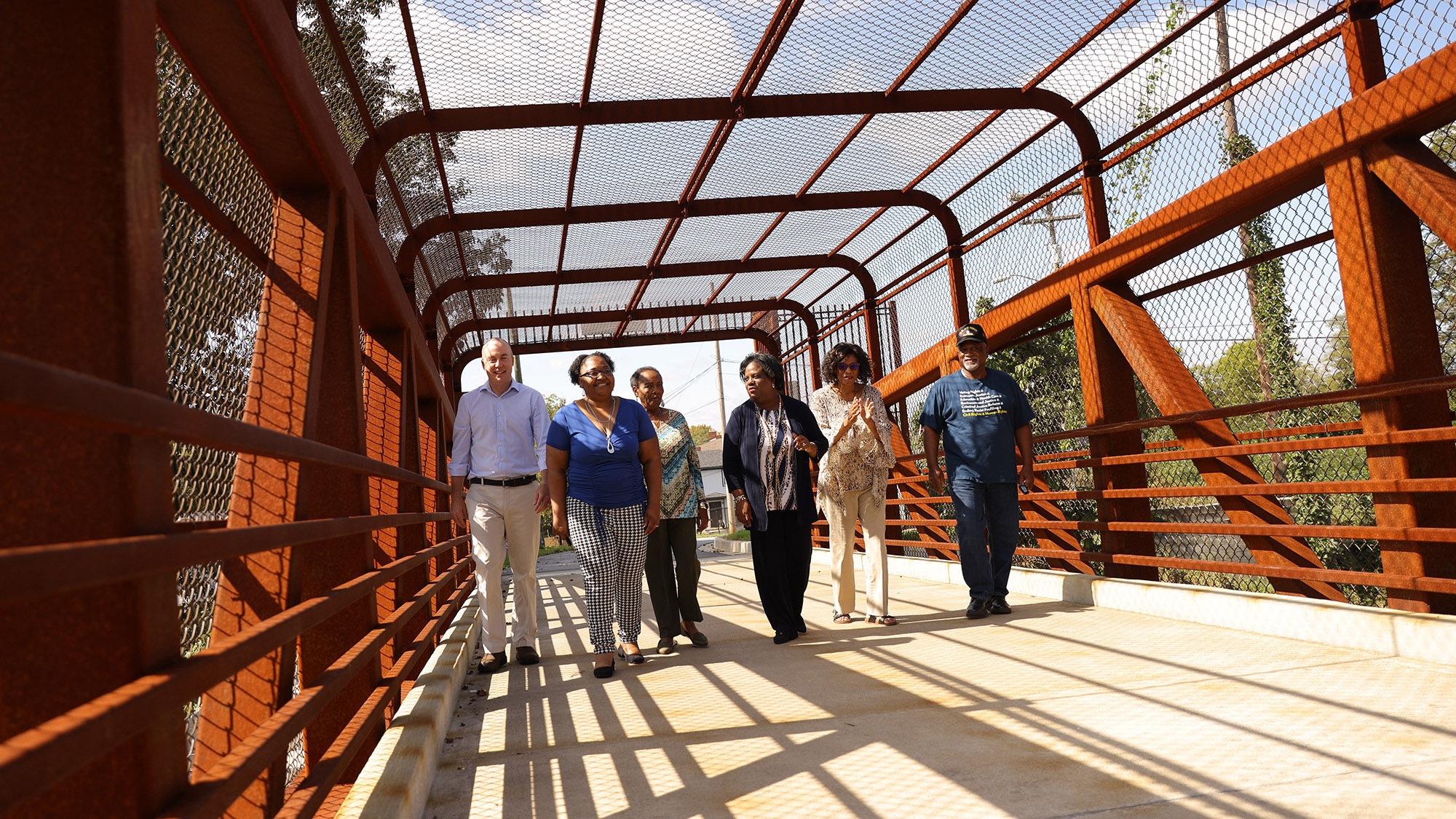Furman professor’s book examines ‘Retail Inequality’ in Greenville
You may have been hearing the phrase “food desert” for more than two decades now. Since it first officially appeared in a 1995 report from a UK government task force, it has become a common talking point in American conversations about the plight of some disadvantaged areas. Simplified, the concept is: Put a grocery store in a poor neighborhood, and the people will eat better and become healthier – and their lives will improve.
It’s a well-intentioned concept, but it’s flawed, says Kenneth Kolb, professor and chair of Furman’s department of sociology.
“There’s really no evidence that increasing access will actually change the way people eat, and we’ve known that now for about 10 years,” he says. “But the idea that distance determines diet is still very powerful and shows up still in about two-thirds of all media accounts.”

Ken Kolb, professor of sociology (far left) at the Hampton Avenue bridge in Greenville’s Southernside neighborhood with (from left) René Vaughn, Mary Duckett, S.C. Rep Chandra Dillard, Lillian Brock Flemming ’71 and Rev. J. M. Flemming.
Kolb has the data to back that up, cited in his book, “Retail Inequality: Reframing the Food Desert Debate,” due to be published in December by the University of California Press. There has been research done nationwide, he says, but the backbone of his book is the years-long ethnographic study he did in the Greenville neighborhoods of Southernside and West Greenville. His work began in 2014, charting the struggles of those two historically Black neighborhoods and working with leaders such as Mary Duckett, Jalen Elrod and Lillian Brock Flemming ’71.
There are reasons the food desert concept has been so palatable, Kolb says.
“It basically catered to the interests of middle-class white people,” he says. “It gave them an entryway into helping the neighborhood without having to engage in really difficult conversations about the role that racism and poverty has played, gutting out their neighborhoods for 20 or 30 years.
“We did these people wrong,” Kolb says, “and they deserve retail restitution.”
The problem of retail inequality, as Kolb sees it, is complex, with roots running deep through the history of deindustrialization, urban public policy, gentrification and racism.
One option residents in Southernside and West Greenville have lost over time is their corner stores – about 33 of them that dotted the neighborhoods as recently as the 1960s, Kolb says. They may have had “outdated, dusty shelves” and a slim offering of canned goods, but they also had owners who lived in the neighborhood and were invested in its success.
“They knew the people who were their customers,” says Kolb. “They looked out for them. It felt like they were run for and by the community. That’s what residents want.”
The 1980s brought big-box stores and changes in urban public policy. White flight continued, property values plunged and focus shifted to the suburbs. Greenville’s appetite for gentrification was evident to Kolb when he arrived in the city in 2008. He watched as retail businesses began to cater to the affluent professionals the city was hoping to attract rather than the longtime residents who were already there.
The policies – redlining maps and neighborhood covenants, for example – that laid the groundwork for these changes “were written in race-neutral language,” Kolb notes, “but they had very racialized consequences. They were basically institutionally racist policies that crushed the urban core in the United States.”
And once the businesses in the urban core died, it became harder for poorer residents without reliable transportation to get to what they needed.
Transportation remains a huge problem – although Kolb notes the rise of underground informal Uber-like “ride networks.” Other issues fueling inequity include everyday realities such as the lack of time or energy to prepare solid meals; many of the people Kolb interviewed told him that home cooking was “just not feasible” for them, leading them to the convenience of prepared foods.
Solutions need to address these everyday realities, Kolb says. What’s missing is what he calls “good retail” – businesses that want to “invest in their community and cater to the wants and needs and preferences of the longtime residents, rather than just extract money from them or exploit the most vulnerable.”
For Kolb, retail equality is very much a social justice issue, and avoiding uncomfortable issues gets us nowhere.
“We live in a consumer capitalistic economy where equal membership means equal opportunity to shop,” he says. “We need to understand that the concept of food deserts caught fire because we’re more interested in dealing with the symptoms of deep social problems than the root causes. We’re more comfortable talking about fresh fruits and vegetables than racism and poverty, and we need to recognize that.”